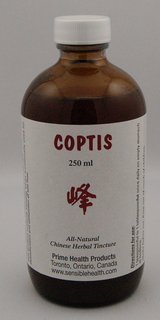
Product Details
Coptis
 One 250 mL (8½ fl oz) bottle
One 250 mL (8½ fl oz) bottle
Stimulates the body's natural bile flow mechanism, thereby improving the functioning of both the liver and gallbladder.
Ingredients: Coptis, Chinese Scutelleria, Qing Pi, Zhi Shi
Directions: 1 teaspoon (about 5 mL) to 1 tablespoon (about 15 mL) once daily on an empty stomach before bedtime.
The primary ingredient of Coptis is Huang Lian, also known as Rhizoma Coptidis or Goldthread. According to medical research, the active constituent of Huang Lian is berberine, which may be good for the heart[1]. Coptis was used by the Native Americans as a folk remedy for canker sores and mouth sores. In traditional Chinese medicine, it is considered a healing herb, and is believed to ward off disease. It is also used to stimulate bile flow. Coptis should not be consumed by newborns, or by women during pregnancy or lactation.
The secondary ingredient of Coptis is Scutellaria, also known as Huang Qin, Baikal Skullcap, or Scutellaria Baicalensis. In traditional Chinese medicine, Huang Qin is believed to "clear heat", particularly in the abdomen[2].
The third and fourth ingredients of Coptis are Qing Pi (also known as Green Tangerine Peel, or Citri Reticulatae Viride Pericarpium) and Zhi Shi (also known as Immature Bitter Orange, or Aurantii Fructus). As their names imply, these are parts of citrus fruit, and have the characteristics of such. In traditional Chinese medicine, Qing Pi is believed to "spread liver chi"[3], while Zhi Shi is believed to "break up chi stagnation" and "direct chi downward"[4].
Notes:
- Be warned that the taste of Coptis is very bitter (more so than other tinctures).
- Avoid when pregnant or lactating.
References:
- From WebMD: Berberines.
- Chinese Herbal Medicine Materia Medica 3rd Edition, D Bensky & S Clavey & E Stöger, Eastland Press 2004, pp131-134.
- Ibid, pp.514-516
- Ibid, pp.516-519
